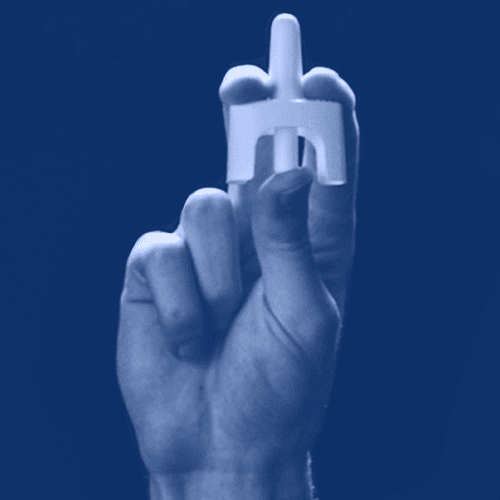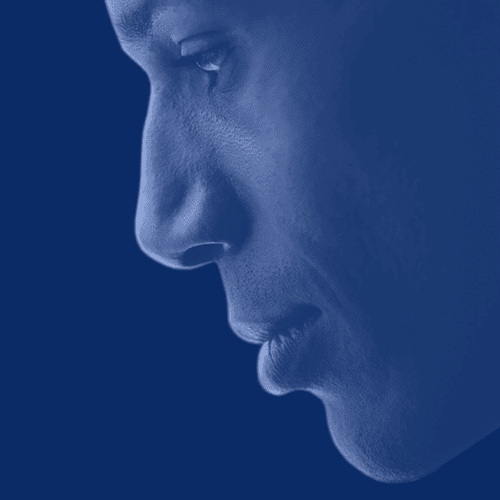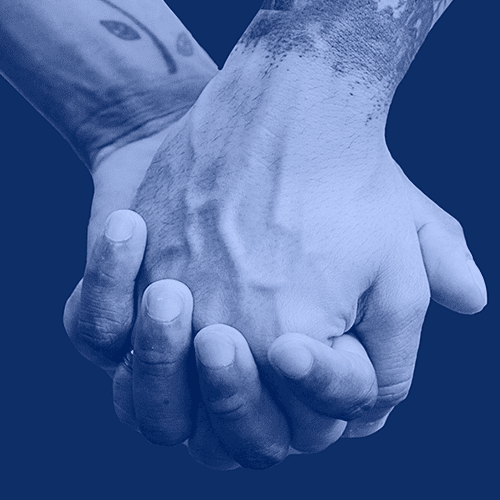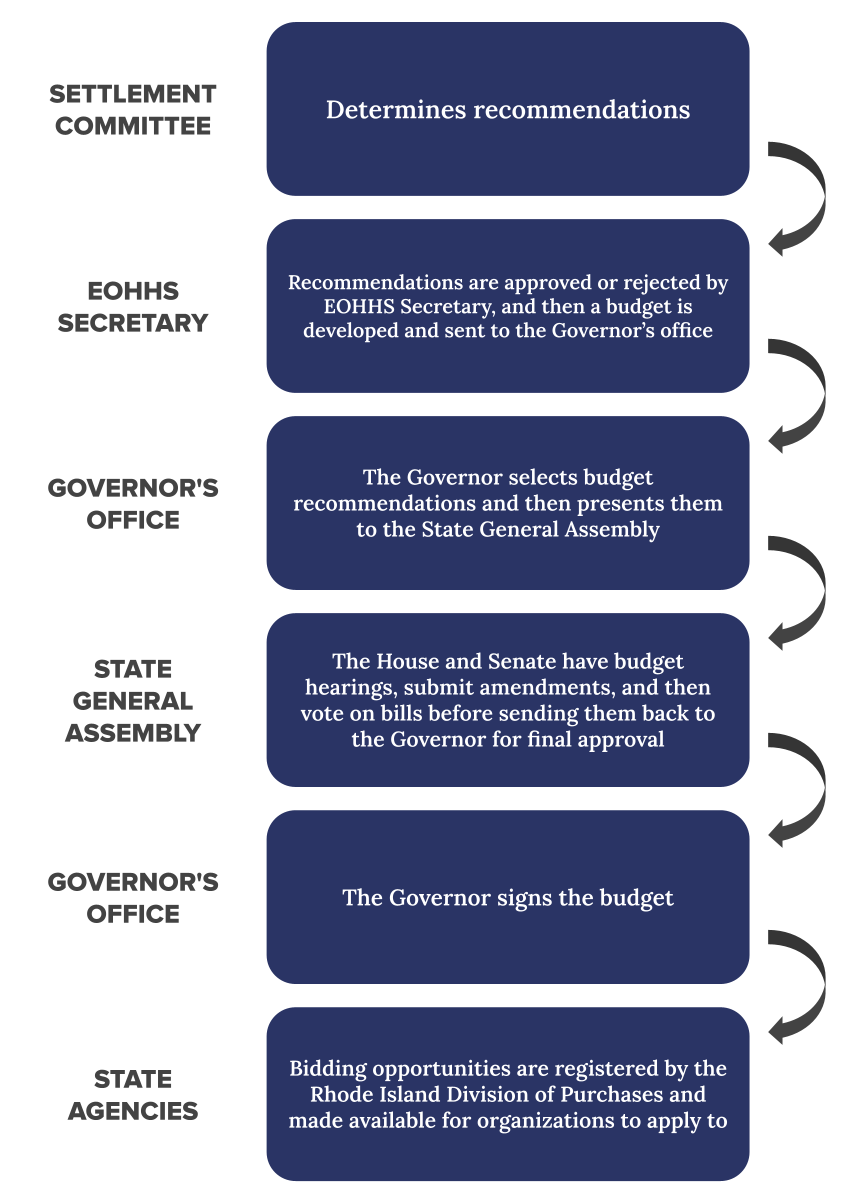What is an opioid settlement?
Nationally, the combined amount of opioid settlements so far is over $50 billion. That amount could go up even more in the coming years as more settlements are reached. The formula for distributing these funds to states is complex and depends on population, overdose risk, and opioid prescribing patterns. You can use this page to learn more about how the settlement works in Rhode Island. You can also see where funds have been spent and learn more about how to get involved.
Rhode Island has a statewide plan
Settlements are funding statewide programs in overdose prevention, treatment, recovery, and harm reduction.
We are using the State’s existing Governor’s Overdose Task Force Action Plan as a roadmap to recommend the distribution of these funds throughout the state. We have already utilized this plan to guide millions of dollars in statewide overdose prevention and substance use treatment investments. The Action Plan is also helping us make sure that funds are equitably distributed, taking into consideration the history of structural racism and its impact on health. Our roadmap for distributing funds is guided by principles developed by Johns Hopkins University. This recommendation process is overseen by state, municipal, and community representatives. The group is called the Opioid Settlement Advisory Committee (OSAC).
How does the settlement process work?
The OSAC first convened in April 2022. Each year, OSAC recommends areas to focus on and approves a funding budget drafted for them by State staff. Next, they present the budget to the Secretary of the Executive Office of Health and Human Services. The Secretary can accept the budget or talk with OSAC to make changes to it. Lastly, the Secretary presents the final budget to the Governor. The Governor puts it in their budget to be considered by the General Assembly. You can learn more about the settlement process here.
In Rhode Island, 80% of all settlement funds follow this process. The other 20% is distributed to our cities and towns based on another formula. Learn more about the settlement process for cities and towns in Rhode Island.
If you are an organization looking to bid on open procurement opportunities, the Executive Office of Health and Human Services (EOHHS) has put together resources and guidance for the bidding and solicitation process. There are also other ways to get involved in the procurement process.
How is the State allocating settlement funds?
Settlement funds have already been allocated to fund projects like addressing social determinants of health such as basic needs and housing, as well as evidence-based prevention programs in schools, mental health and treatment services, harm reduction programs, and recovery supports. The chart below shows how funding allocations change over time. Further below, you can learn more about specific programs being funded.
What types of programs are being funded?
On June 12th, 2024, the Rhode Island Foundation, in partnership with the Executive Office of Health and Human Services, announced it has awarded $1.3 million in grants to 20 nonprofits on the front lines of addressing the state’s overdose crisis using funds from the Opioid Settlement. The grants were awarded in three categories: Basic Needs Support, Family Support, and Trauma Support.
Most of the settlement funds fall under these statewide effort areas. Click each section to learn more:
Social Determinants of Health & Prevention

Settlement funds are going to programs that can reduce the risk of overdose by supporting people as early as possible, including:
- Providing basic needs supports, such as food, tents, and sleeping bags, including Access to Recovery’s Statewide Recovery Basic Needs Project, which helps people who are newly seeking or struggling to sustain recovery by providing up to $500 for bedding, furnishings, clothing, bus passes and food among other needs
- Providing transportation to treatment or recovery programs or services
- Provide services tailored to disproportionately impacted communities including the Mobile Wound Care and Medical Respite Care Pilot Program for people experiencing housing insecurity or houselessness
- Wrap-around and community services like housing, transportation, education, job placement, job training, or childcare, including Progreso Latino’s Comprehensive Family Support Initiative, which will connect people to bilingual peer and family support groups, social services, youth mentorship, wellness activities and educational opportunities
- Funding evidence-based school and community education programs including Rhode Island Student Assistance Services (RISAS)
- Supporting greater access to community-based mental health services and supports for young people
Rescue & Harm Reduction

Funding for Rescue and Harm Reduction focuses on using tools to help people be safer when using drugs, including:
- Supporting harm reduction services and other evidence-informed harm reduction programs, including Rhode Island’s first Overdose Prevention Center
- Centralized distribution center of naloxone for community-based organizations and community members
- Education and training for individuals and organizations on naloxone and other drugs treating overdoses
- Maximize access to harm reduction resources by investing in community outreach organizations
- Connecting individuals to treatment or other services following an opioid overdose
Treatment

Settlement funds are helping ensure that anyone who is interested in treatment can get help. Funding currently supports:
- Mobile intervention, treatment, and recovery services including resources for BIPOC Industry Workers
- Training on medically-assisted treatment for healthcare providers, first responders, students, peer recovery coaches, and outreach specialists
- Increasing low-barrier access to Medications for Opioid Use Disorder (MOUD)
- Increasing the availability of treatment beds
Recovery

Settlement funds ensure recovery from substance use disorder is possible for everyone. Funding is supporting:
- Recovery Community Centers that provide recovery services and peer-recovery for individuals with opioid use disorder
- Access to recovery housing for individuals with opioid use disorder and any co-occurring conditions
- Job training or educational services for individuals in treatment or recovery
- Families affected by substance use disorder
- Investments in community-based mental health services and the recruitment, support, and training of Peer Recovery Specialists, including through 2nd Act’s Rhode Island Peer Support Alliance initiative



